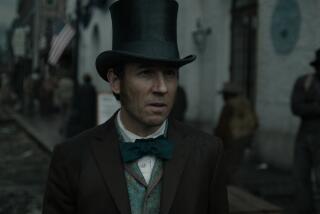Lincoln’s Journey: A Fable for Today : History: Transcending his background gave us the Emancipation Proclamation and the Gettysburg Address.
- Share via
Abraham Lincoln was killed by an American Indian. The year was 1786, a time of neither peace nor war between the settlers and the earlier inhabitants. The dead man was the grandfather of the Abraham Lincoln the world knows.
The elder Lincoln, a sturdy, gun-carrying pioneer of Quaker descent, was planting his Kentucky cornfield along with three of his sons. Then a shot rang out: Abraham lay dead on the field. Josiah, 12, ran to get help. Mordecai, 15, took cover in a cabin close by. Eight-year-old Thomas just sat paralyzed by his dead father. The Indian began creeping out of the woods. Step by step, death or captivity moved closer to the young Thomas. But his brother, hiding in the cabin, picked up a rifle and shot the murdering Indian.
Thomas Lincoln lived to a ripe old age and repeated this story endlessly. But from that deadly moment in the Kentucky forest, his life had changed forever. Instead of growing up the son of a bold, prosperous and respected farmer, owner of 5,500 acres of prime land (which went to the eldest son), Thomas grew up a poor orphan.
“By the death of his father and the very narrow circumstances of his mother, even in childhood [he] was a wandering laboring boy, and grew up literally without education. He never did more in the way of writing than to bunglingly sign his own name.” Words from the mouth of the author of the Gettysburg Address, his son. This bit of family history came to be indelibly carved into the future president’s “mind and memory,” to repeat his carefully chosen words from 1854.
Some historians might look on the first Abraham Lincoln’s death quite differently, from the perspective of the Native American defending his home grounds. According to that view--of course beyond the horizon of the Lincoln family--Abraham Lincoln only got what he had coming.
Now let us move to the Illinois frontier of 1832. Illinois flamed up in an ugly war that year as the Sauk and Fox tribes, led by Black Hawk, tried to reclaim their ancestral lands. The 22-year-old future president volunteered to fight the “invaders.” He saw no action and later made fun of his sole military service, but it gave him his first taste of triumph before the people. His militia company elected Lincoln captain. As late as 1860, running for the presidency of the United States, he remembered this as a “success which gave me more pleasure than any I have had since.”
The new captain got tested quickly. An old Indian wandered into camp and Lincoln’s men, hungry for action, got ready to lynch him. But the grandson of the murdered Abraham stepped in front of the old man, put his family history and newfound role as a leader on the line and stopped a new murder.
Lincoln’s views and later policies toward Native Americans--though quite open to criticism--are not the subject here. Rather, it is his gift to transcend his background; to move beyond tribe, distrust and past injury; to be good and decent at a time when it was not easy to be good and decent.
A little while before this incident, in 1829, Lincoln and an equally young companion took a produce-laden flatboat from southern Indiana down to the New Orleans market. From the Ohio River they went on their leisurely way into the Mississippi and then started exchanging goods along the Louisiana coast of sugar plantations. All went well until one unforgettable night. Lincoln recounted in an autobiographical sketch how he and his friend “were attacked by seven Negroes with intent to kill and rob them. They were hurt some in the melee, but succeeded in driving the Negroes from the boat” and escaped for dear life.
The modern historian once again might provide at least two perspectives. One would be of robbers attacking innocent people. Another might see enslaved men fighting back in the only way they could. We do not know to what degree Lincoln had an inkling of such a double perspective. We do know that his road led to Emancipation and the Gettysburg declaration’s “new birth of freedom” 133 years ago this week,
Americans are forever looking to Lincoln for guidance. What would he do today, people ask. The historian needs to be cautious in giving answers. Back in the 1960s, when I was a young graduate student in Boston and busing for racial balance in the schools grew to be a heated topic, people asked me, “What would Lincoln say about busing?” My reply, for once, could be certain: “What is a bus?”
And yet history’s Lincoln may offer us lessons for today, in his journey from ancestral memories and the Louisiana sugar coast to the Gettysburg cemetery.
More to Read
Sign up for Essential California
The most important California stories and recommendations in your inbox every morning.
You may occasionally receive promotional content from the Los Angeles Times.










